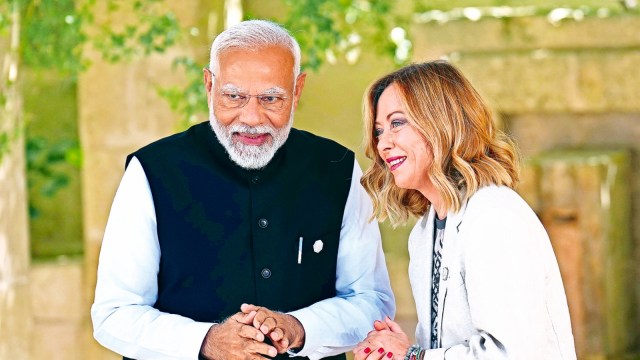
The Group of Seven countries (G7) began its summit meeting at Puglia in southern Italy on the Mediterranean coastline on predictable lines. On the first day of the summit, the seven leaders present — Joe Biden from the US, Olaf Scholz from Germany, Justin Trudeau from Canada, Emmanuel Macron from France, Fumio Kishida from Japan, Rishi Sunak from the UK and the host, Giorgia Meloni from Italy — announced that they reached a “deal” to “use profits from frozen Russian Central Bank assets” to shore up $46 billion support for Ukraine.
“With a view to supporting Ukraine’s current and future needs in the face of a prolonged defence against Russia, the G7 will launch ‘Extraordinary Revenue Acceleration (ERA) Loans for Ukraine’ in order to make available approximately $ 50bn in additional funding to Ukraine by the end of the year”, a statement declared. Ursula von der Leyen, President of the European Commission — herself mired in controversies while seeking a second five-year term — pompously declared that it was a “very strong message” to Putin that “he cannot outlast us”. “It is not European taxpayers that are paying for the Russian damage in Ukraine, but it is Russia,” she also stated.
The legality of this action notwithstanding, many G7 leaders may not last for long in their current positions, much less “outlast” Putin. Biden faces a difficult election later this year. Indications are that Donald Trump will return to the White House. Incidentally, during his previous term, Trump did not enjoy particularly good relations with other G7 leaders like Merkel and Macron. The UK is going to the polls on July 4, in which Rishi Sunak’s Conservative is likely to face a drubbing. Trudeau, too is unpopular within his own Liberal Party with a majority wanting another leader to lead them in the elections next year.
In Europe, recently concluded elections to the European Parliament left the ruling liberal elites in several countries red-faced as the right-wing parties secured major mandates in country after country. In France, rattled by the results of that election, in which Marine Le Pen-led Rassemblement National (RN) party, branded by the adversaries as “far right”, secured a big majority, President Macron announced snap elections to parliament on June 30. If the right and far-right parties come together and win the elections, it may be the end of the road for Macron. In Germany too, the Far-Right Alternative for Germany (AfD) made significant gains putting Chancellor Olaf Scholz in an awkward situation. With popularity ratings plummeting to an all-time low, Scholz too is expected to go soon. The only leader going strong in the group is the prime minister of Italy. Her conservative Right-wing party, Fratelli d’Italia (Brothers of Italy — FdI), gained significantly in the EU elections.
With this underlying political reality, the G7 itself has lost relevance and charm after five decades of its existence. Like its 21st-century cousin, the G20, this body too was essentially a product of a financial crisis, in the 1970s. Started as a group of six countries — the US, France, Germany, Italy, Japan and the UK — the body got additional members like Canada and Russia soon and became G8. Several countries, including India, China, and the European Union became participants in the Outreach group since 2003. After the expulsion of Russia in 2014, when it occupied Crimea, the group became G7. Italy assumed its presidency earlier this year and is hosting the summit in that capacity.
At the time of its creation, the G8 was a powerful club of leading economies controlling almost 60 per cent of the world’s GDP. Today, that financial influence has greatly diminished. Moreover, the emergence of G20 — now G21 after the African Union was admitted last year at the behest of India — has overshadowed G7’s importance. G21 is a much bigger grouping controlling almost 80 per cent of the world’s economy. Unlike G7, which is primarily a club of the Western powers, it has representation from all parts of the world.
While we have a global multilateral framework for managing peace in the world in the form of the United Nations and its allied Bretton Woods institutions like the IMF and the World Bank, recessions and other economic crises prompted America to create minilateral groups like the G7. They served their purpose during the economic crises but continued thereafter donning a political avatar undermining global multilateralism and championing partisan interests. As the UN is losing its relevance, the world is getting crowded with more and more such minilaterals like BRICS, SCO and AUKUS.
Prime Minister Narendra Modi is attending the Outreach segment of the summit along with his counterparts from other invited countries. Interestingly, the statement put out by him before leaving for Italy focused more on the bilateral relations between India and Italy than on the G7 summit agenda like “rules-based international order”. Modi recalled his past two visits to Italy and Meloni’s two visits to India and said that they were “instrumental in infusing momentum and depth in our bilateral agenda”. He added that India and Italy would “consolidate the strategic partnership” and “bolster cooperation in Indo-Pacific and Mediterranean regions”.
As rightly emphasised by PM Modi, India’s priority, whether at the G7 or any other minilateral, should be to bring synergy between the agendas and outcomes of the G20 summit presided over by it last year and the agenda of that minilateral. Ever since it became a member of the Outreach group in G7, India always tried to push agenda items that are relevant for the rest of the Global South like climate and energy transition issues. For the G7 to remain relevant, it must demonstrate seriousness about the issues that India is championing, like “artificial intelligence, energy, Africa, and the Mediterranean”.
The writer, president, India Foundation, is with the RSS
Click here for real-time updates on the Lok Sabha Election Results 2024
© The Indian Express Pvt Ltd
First uploaded on: 15-06-2024 at 07:40 IST


